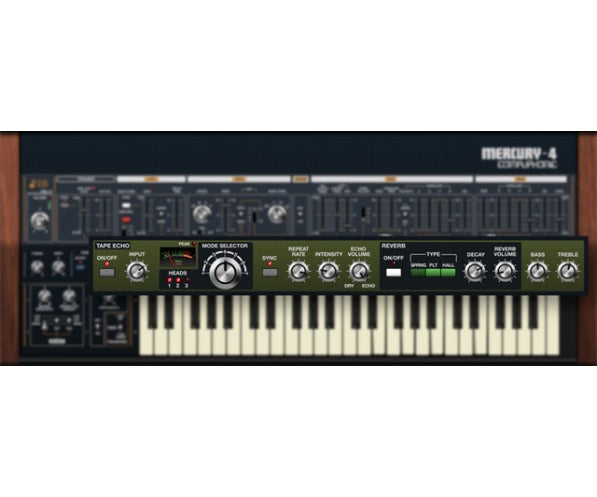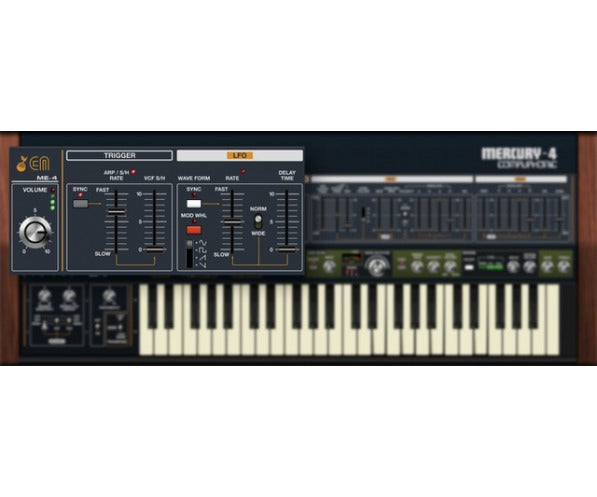Description
Poly In The Beginning
Originally released in 1978, the Roland Jupiter-4 synthesizer was one of the earliest instruments to combine voice-assign polyphony with digital patch storage - that is, the ability to store and recall sounds to a digital memory and recall them at the touch of a button. By "voice-assign polyphony,” we're referring to instruments with a finite number of independent synthesizer voices (four, in this case) that digitally scan the keyboard and assign notes to onboard voices. These days, voice-assign polyphony and digital patch storage are taken for granted, but this was a HUGE deal in the late 70s when options for polyphonic synthesis were mostly limited to crude string synthesizers based upon 60s organ technology, and patch recall was generally limited to how fast you could twirl knobs and flick switches!
In its day, the Jupiter-4 was overshadowed by larger, more complex (and far more expensive) instruments from American synth manufacturers, and on paper, its specs weren’t as impressive. But specs don't tell the whole story, because the Jupiter-4 sounds fantastic, with a raw, raunchy tone not found in any of the other beloved Juno and Jupiter synths. Its analog oscillators have a uniquely aggressive tone quality, the built-in sub oscillator adds girth, its oddly fast and deep LFO modulation capabilities allow it to create uniquely whacked out modular synth-like tones, and Roland's famous stereo chorus "ensemble" circuit is beautifully implemented, adding a boatload of width and dimension.
The original instrument had its share of caveats, including a meager eight user patch locations, no edit mode for stored patches, just four voices of polyphony, it weighed a ton (a portly 42 lb!), and the lack of oscillator autotune meant a cold breeze could send it careening out of tune. Cherry Audio's Mercury-4 addresses every one of these issues, with up to 16-voice polyphony, infinite patch storage, easy patch editing, and much more.
In addition to recreating the Jupiter-4's uniquely powerful oscillator and filter tonality, Mercury-4 beautifully replicates Roland’s renowned stereo ensemble effect. We’ve also added a truly other-worldly "Space Echo"-style tape echo with multiple reverb modes. The tape echo perfectly recreates the warm tonality and subtle speed variations that make the original Space Echo units so desirable, and the reverb section expands upon the original spring reverb with plate and hall modes for enhanced spatial depth.
Mercury-4 Features:
- Authentically modeled oscillator with sub oscillator
- All filter characteristics modeled, including powerful low-frequency resonance
- Up to 16-voice polyphony
- Over 400 presets, programmed by industry veterans
- Exactingly replicated unique arpeggio section w/tempo sync
- Carefully modeled wide-range LFO modulation with "inverted" mod characteristics
- Drift control for increased analog realism
- Precisely replicated stereo ensemble effect
- Warm and organic tape echo with multiple reverb modes
- Tempo-syncable LFO
- Detunable unison mode
- Single-key chord memory mode
- Highly optimized coding for high performance with ultra-low CPU load
- Advanced one-click UI magnification
- Comprehensive MPE support
- Full MIDI control and DAW automation for all controls
Mercury-4 is available in AU, VST, VST3, AAX, and standalone formats.
A free 30-day demo of Mercury-4 is available. This demo will play white noise periodically, but is otherwise unlimited.
macOS Requirements: macOS 10.9 or above (including macOS 12), 64-bit required. M1 processor compatible (via Rosetta 2). Quad-core computer with 8GB of RAM recommended.
Windows Requirements: Windows 7 or above, 64-bit required. Quad-core computer with 8GB of RAM recommended.



